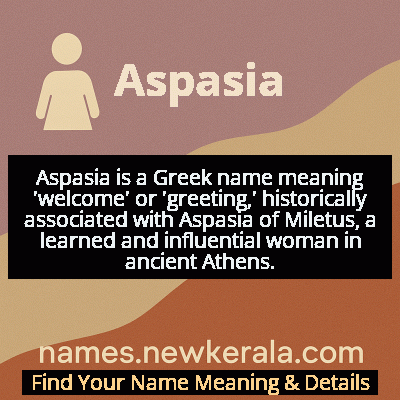Aspasia Name Meaning & Details
Origin, Popularity, Numerology Analysis & Name Meaning of Aspasia
Discover the origin, meaning, and cultural significance of the name ASPASIA. Delve into its historical roots and explore the lasting impact it has had on communities and traditions.
Name
Aspasia
Gender
Female
Origin
Greek
Lucky Number
3
Meaning of the Name - Aspasia
Aspasia is a Greek name meaning 'welcome' or 'greeting,' historically associated with Aspasia of Miletus, a learned and influential woman in ancient Athens.
Aspasia - Complete Numerology Analysis
Your Numerology Number
Based on Pythagorean Numerology System
Ruling Planet
Jupiter
Positive Nature
Optimistic, inspirational, and creative.
Negative Traits
Scattered, exaggerating.
Lucky Colours
Yellow, gold, purple.
Lucky Days
Thursday.
Lucky Stones
Yellow sapphire.
Harmony Numbers
1, 2, 9.
Best Suited Professions
Arts, writing, communication.
What People Like About You
Creativity, optimism.
Famous People Named Aspasia
Aspasia of Miletus
Philosopher and Educator
Influential intellectual companion of Pericles, teacher of rhetoric, and prominent figure in classical Athens
Aspasia Manos
Greek Aristocrat
Wife of King Alexander I, mother of Queen Alexandra, broke royal marriage traditions
Aspasia Papathanasiou
Archaeologist
Significant contributions to Bronze Age Aegean archaeology and Minoan studies
Aspasia Anos
Academic
Modern Greek philosopher and gender studies scholar
Name Variations & International Equivalents
Click on blue names to explore their detailed meanings. Gray names with will be available soon.
Cultural & Historical Significance
Extended Personality Analysis
The name Aspasia evokes a personality profile characterized by intellectual depth, social grace, and resilient intelligence. Those bearing this name are often perceived as natural intellectuals with a love for learning and discourse. They typically possess excellent communication skills, able to articulate complex ideas with clarity and engage meaningfully with diverse perspectives. Drawing from the historical Aspasia's reputation as a salon host, modern Aspasias often excel in social settings, creating welcoming environments where ideas can flourish. They tend to be emotionally intelligent, with a keen understanding of human nature that helps them navigate complex interpersonal dynamics. While confident in their abilities, they often exercise influence subtly rather than seeking overt authority. Aspasias typically demonstrate cultural sophistication and appreciation for the arts, along with a progressive outlook that values inclusion and diversity of thought. Their resilience—mirroring the historical Aspasia's ability to thrive as an outsider in Athenian society—often manifests as quiet determination and the capacity to overcome obstacles through intellect and diplomacy rather than confrontation. They value meaningful relationships and intellectual companionship, often serving as trusted advisors and connectors within their social circles.
Modern Usage & Popularity
In contemporary naming practices, Aspasia occupies a unique niche as a classical name that combines historical depth with feminist resonance. While never achieving widespread popularity, it maintains a consistent presence particularly among Greek families, classical scholars, and parents seeking names with intellectual pedigree. The name has experienced slight increases in usage during periods of renewed interest in classical antiquity and women's history. In Greece, it remains an educated, somewhat aristocratic choice, while internationally it appeals to parents looking for distinctive names with strong historical associations. Modern usage often reflects appreciation for Aspasia of Miletus as an early example of female intellectual achievement, making the name particularly attractive to families valuing education and gender equality. The name's rarity adds to its appeal for parents seeking unique yet meaningful options. While not appearing in mainstream popularity rankings in English-speaking countries, Aspasia continues to be chosen by those who appreciate its combination of classical elegance, historical significance, and subtle feminist statement. Its usage patterns suggest it will remain a sophisticated, niche choice rather than becoming trendy or common.
Symbolic & Spiritual Meanings
Symbolically, Aspasia represents multiple layers of meaning that transcend its literal translation of 'welcomed.' It embodies the concept of intellectual hospitality—the welcoming of diverse ideas and perspectives into meaningful dialogue. The name symbolizes cultural bridging, reflecting how the historical Aspasia brought Ionian intellectual traditions to Athens and facilitated exchange between different philosophical schools. It represents the power of intellect to overcome social barriers, as Aspasia achieved influence despite her status as a foreign woman in patriarchal Athens. The name also carries metaphorical significance as a symbol of female mentorship and intellectual community, recalling Aspasia's role in educating prominent Athenian thinkers. In a broader sense, it represents the often-hidden contributions of women to intellectual history and the importance of creating spaces where diverse voices can be heard. Aspasia symbolizes the idea that true welcome involves not just acceptance but active engagement with different perspectives, making it a powerful metaphor for inclusive intellectual and social communities. The name continues to inspire as a symbol of how intelligence and diplomacy can create influence beyond formal power structures.

